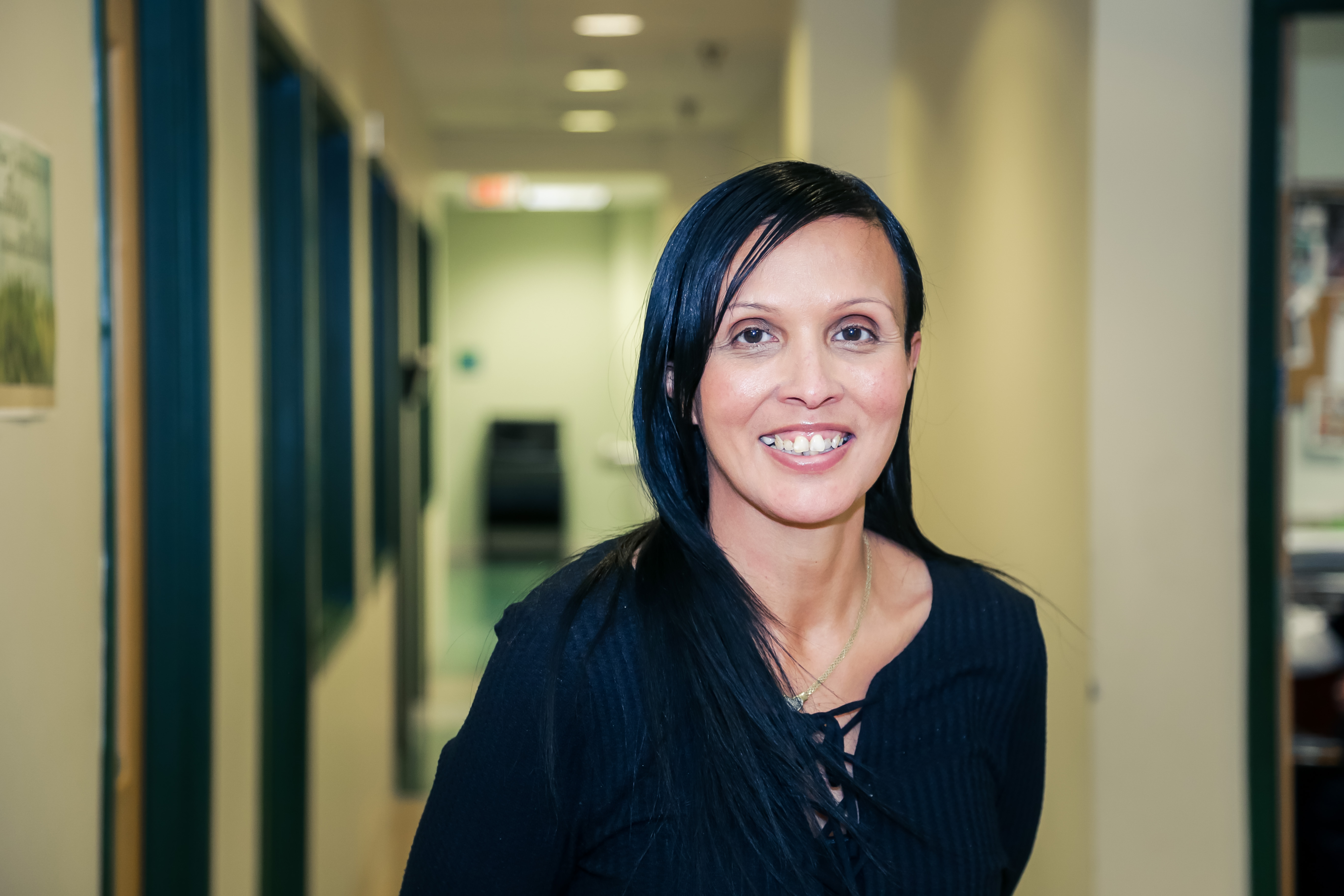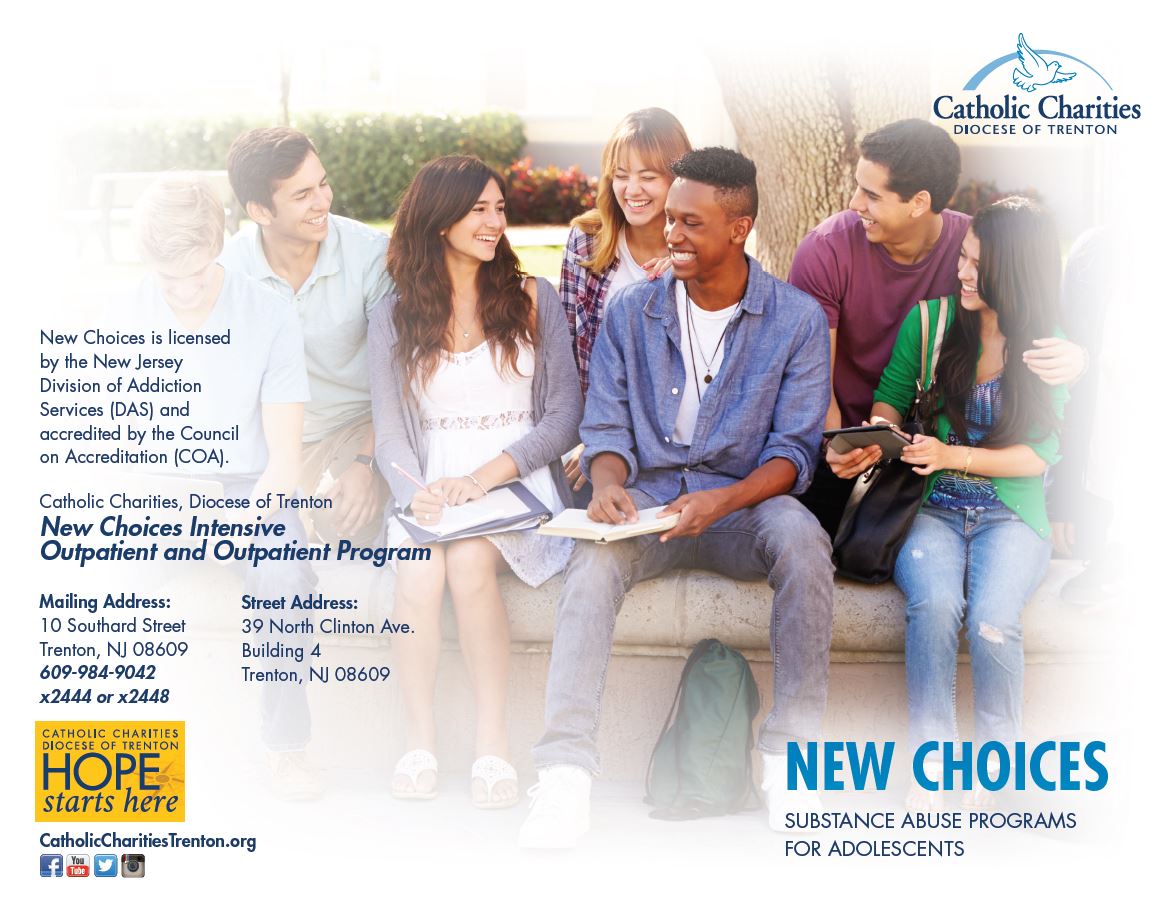Addiction program for teens expanding to help young adults to age 21
An addiction-recovery program Catholic Charities, Diocese of Trenton offers for teenagers in Mercer County recently expanded to serve youth up to age 21. The change is meant to bridge the gap between childhood and adulthood – a vulnerable time when troubled young adults with unresolved adolescent problems can get lost in an adult system with adult consequences.
 The program, called New Choices, received $110,833 in county funding in November to serve young adults age 18 to 21 through the end of this year.
The program, called New Choices, received $110,833 in county funding in November to serve young adults age 18 to 21 through the end of this year.
“Once they’re 18, they age out (of services). But their problems aren’t always resolved, and so they get lost in the cracks,” said Aida Albino Wimbush, New Choices program supervisor (pictured, left). “Once they get lost in the cracks, their actions can have lifelong consequences.”
Haunted for life
Take, as an example, someone who commits a crime to support their addiction.
A juvenile’s criminal record is not public record and so won’t necessarily hurt their chances of becoming a successful adult. But once a child turns 18, the system charges them as an adult. An adult criminal record is public record and can haunt a person for life, affecting everything from enrolling in college or vocational school to landing a job to getting a home to securing public assistance.
Further, a juvenile who commits a crime to support his or her addiction could have the offense forgiven by completing a program like New Choices, while adults instead are likely to be ordered into inpatient treatment or even jail.
Expanding the New Choices program to age 21 gives young adults the opportunity to recover from their addiction and find stability within a community-based, therapeutic program, instead of the harsher environment of jail or a drug rehab, Wimbush said.
And while someone who’s 18 is technically an adult, Wimbush added, “they aren’t really. Most of the clients we see who are that age still live with their parents or grandparents. They’re still struggling to get a job or finish school. They’re still closer to childhood than adulthood, and so they need this additional support.”
A holistic approach
New Choices is a substance-abuse recovery program with staff who specialize in treating adolescents age 13 to 17, and now, young adults up to 21.
 Staffers offer wraparound support to encourage long-term abstinence by addressing the youth’s needs relating to health, peer and family relationships, education, mental health, legal issues, and social activities.
Staffers offer wraparound support to encourage long-term abstinence by addressing the youth’s needs relating to health, peer and family relationships, education, mental health, legal issues, and social activities.
The program provides free transportation and a daily meal. All activities are scheduled after school, ensuring participants are able to attend school regularly. Family counseling can be arranged. And organized outings are regularly planned to foster positive recreation without the use of drugs or alcohol.
The program can accommodate up to 43 teenagers ages 13 to 17 at a time. The new funding enables New Choices to serve up to 12 young adults age 18 to 21 at a time. Most program participants typically spend eight to 14 weeks in the program before “graduating.”
The program is not currently at capacity and welcomes new applicants. Participants often are referred by the court or child-welfare systems. But walk-ins and family referrals are welcome too.
 Trauma and gambling addressed
Trauma and gambling addressed
The program aims to better serve clients by ensuring staff get specialized training to address the unique needs of its teenagers.
For example, counselor Jenna Mitchell (pictured, right) recently got certified in trauma-informed treatment. For many program participants, it’s not uncommon to experience or witness violence in their neighborhoods. In fact, three program participants were seriously injured, and one killed, in separate shooting incidents in the past year.
Mitchell also now is pursuing her certification from the Council on Compulsive Gambling of New Jersey to treat clients who struggle with gambling addiction.
Some teenagers regard gambling as a way to make money faster than working a low-wage job, Mitchell said.
“It’s really about coming up, financially, for them,” said Mitchell, adding that cards and dice are the most common forms of gambling she has seen teenagers do. “It’s also about taking risks, so it fulfills something in that sense, too.”
Yet gambling can easily become an addiction, Mitchell said. It can also lead to additional criminal trouble, because gambling typically is restricted to casinos, racetracks, and online betting in New Jersey. The National Council on Problem Gambling estimates that 4 to 5 percent of all teens age 12 to 17 meet one or more criteria for having a gambling problem.
For help
Call New Choices at (609) 984-9042, ext. 2444 or ext. 2448. Or call our Access, Help and Information Center at 1-800-360-7711.
To subscribe to our blog posts and news releases, fill out the fields below.


The counterintuitive success of MAT: Using drugs to beat drug addiction - - June 21, 2019, 8:08 am
[…] My Baby and Me (for pregnant women and new mothers who are homeless or at risk of homelessness), New Choices (for youth up to age 21), Partial Care (for adults with mental illness), and outpatient services […]